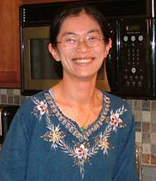|
Angelina
Fong

|
Post-Doctoral
Fellow, Zoology (UBC)
PhD.
(Monash University, Melbourne,
Australia)
BSc
Hons. (Monash University)
Contact
Info:
Department
of Zoology
University of British Columbia
6270 University Blvd.
Vancouver, British Columbia
Canada, V6T 1Z4
Tel: (604) 822-5799
FAX: (604) 822-2416
fong@zoology.ubc.ca
|
Newborn
mammals of many species exhibit different
respiratory responses to environmental
challenges compared to their adult
counterparts. For example, neonates
of many species (such as rats) can
survive hypothermia (cold) or hypoxia
(low oxygen) that would be intolerable
by adults of the same species. During
these extreme challenges, respiration
ceases but restarts upon return to
more ‘normal’ conditions. This transition
from neonatal to adult characteristics
(ontogeny) may involve changes in
the brain, including the central respiratory
rhythm generators. However, not all
species of mammals appear to undergo
this transition. Thus, in addition
to developmental changes, there are
also species differences (phylogeny)
to the tolerance of environmental
challenges by the respiratory system.
The
phylogenetic difference in the developmental
changes from neonatal to adult characteristics
may depend on how well developed the
newborn is at birth. The focus of
my research is to examine the postnatal
development of respiratory response
to hypothermia, hypoxia and hypercapnia
(high carbon dioxide) using a number
of different species along the altricial-precocial
spectrum. We hypothesise that species
with young born more immature (altricial)
will exhibit greater differences between
neonatal and adult responses. These
differences may originate in different
cellular mechanism, including differing
dependence on pacemaker currents,
involved in the generation of respiratory
responses between ages and species.
Understanding the ontogeny of the
respiratory systems in mammals may
shed insight into developmental changes
in the respiratory system of humans,
especially in situations when breathing
stops and is unable to restart, such
as SIDS.
Last updated:
15 November, 2007
|